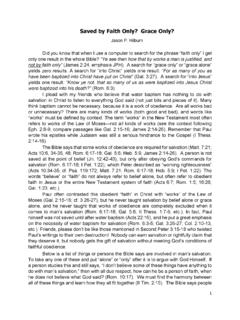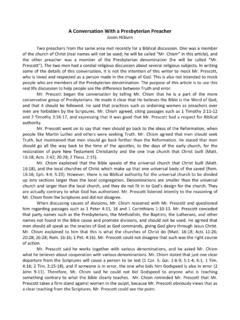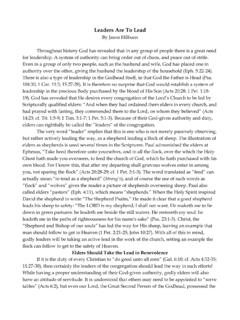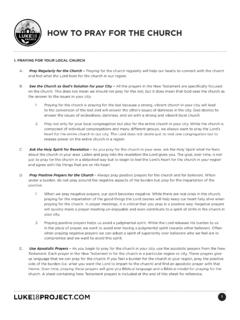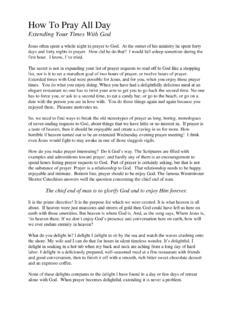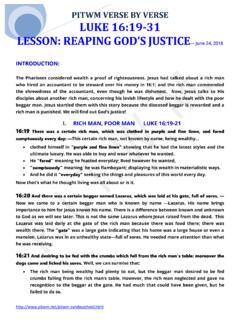Transcription of We Need the Truth About “Praying to Jesus”
1 1 We Need the Truth About praying to jesus Jason Patrick Hilburn Introduction - Why Do We Need The Truth ? Why do Christians need the Truth About praying to jesus ? Does it really matter how Christians pray? Can Christians worship God any way their emotions lead them, or must they faithfully adhere to God s instructions? jesus did not tell the Samaritan woman at the well that worship is subjective, or that it does not matter how one worships; He very clearly taught that true worshipers are those who worship God the way God has specified (Jn. 4:20-24). Prayer is an act of worship, and the fundamental Truth regarding who should be addressed in prayer is needed for Christians to perform this act of worship properly. May men never forget that worshiping in unauthorized ways is evil (I Jn. 3:12; cf. Gen. 4:1-7; Ex. 32; Lev. 10:1-3; I Sam. 15:22-23; I Kgs.)
2 12:26-33; 13:33-34; 14:9, 16; 15:30, 34; 16:2; Mt. 15:9; Col. 2:23; Heb. 11:4, et al.). This realization should cause Christians to be extremely careful About how they worship. After two sons of Aaron were devoured by fire for offering unauthorized worship, this is what God had to say: ..I will be sanctified in them that come nigh me, and before all the people I will be glorified (Lev. 10:3). Even though Aaron had just lost his two eldest sons, he understood what God meant, and he held his peace. Those who presume to worship God in an unauthorized way fail to sanctify and glorify God, and they also demonstrate a lack of faith (Heb. 11:4; cf. Rom. 10:17). The Truth on this subject is also needed for Christians to be sanctified, or set apart from the world, as jesus requested in His prayer to the Father (Jn. 17:17, 19). Those of the world pray to angels, human ancestors, so-called saints, Mary, and others.
3 What sets true worshipers apart from false, worldly worshipers when it comes to prayer? True worshipers make sure they have divine authority from God s Word for their actions in prayer, rather than praying according to the 2 instructions of uninspired men or simply by the way they feel (Jn. 4:23-24; 17:17; cf. I Sam. 15:22-23; Ps. 118:8; Prov. 14:12; 16:25; Col. 3:17). The Truth on this subject is also needed for Christians to be united together as one. This was jesus most frequent request in His prayer to the Father, with Him using the word one no less than six times (Jn. 17:11, 20-23). The unity the Lord desires happens when Christians do what the Apostle Paul wrote: Now I beseech you, brethren, by the name of our Lord jesus Christ, that ye all speak the same thing, and that there be no divisions among you; but that ye be perfectly joined together in the same mind and in the same judgment (I Cor.)
4 1:10; cf. 14:37; Phil. 3:16; Amos 3:3). Can Christians all speak the same thing and be perfectly joined together in the same mind and in the same judgment regarding prayer? To say no is to say that Christians are unable to obey God s commands to do so; yet that is not the case (I Jn. 5:3). Are Christians willing to preserve unity and peace within the body of Christ by adhering to what the Spirit has clearly revealed, endeavouring to keep the unity of the Spirit in the bond of peace ? (Eph. 4:3). God s Word answers the question of whether or not Christians may pray to jesus or the Holy Spirit. However, the refusal of many to accept God s Truth has removed unity and peace from some congregations. Congregations have faced serious problems and even divided within recent years because of this issue (cf. Rom. 16:16-19; II Cor. 11:3-4). To be united and speak the same thing regarding prayer or any other spiritual matter requires Christians to speak as the oracles of God (I Pet.
5 4:11; cf. Isa. 8:20; II Tim. 1:13). Therefore, what do the oracles of God reveal? What Is the Truth ? The Truth is that men must be taught how to pray properly, and Christians have been consistently taught to pray always to their Father. When jesus disciples asked to be taught how 3 to pray, jesus did not tell them it did not matter. He gave them a basic pattern to follow, which included the One they were to address in prayer: And it came to pass, that, as he was praying in a certain place, when he ceased, one of his disciples said unto him, Lord, teach us to pray, as John also taught his disciples. And he said unto them, When ye pray, say, Our Father which art in heaven, Hallowed be thy (Lk. 11:1-2). On another occasion in a different location, jesus taught the exact same pattern of praying to the Father! (the Sermon on the Mount, Mt. 6:6-15).
6 Although the model prayer was not meant to be a fully-comprehensive or permanent model in every way (cf. Jn. 16:24; I Tim. 2:1-6), the teaching that Christians are to pray to the Father remained consistent throughout the Gospel accounts and the entire New Testament Scriptures (Jn. 14:6, 13-14; 15:7-8, 16; 16:23-29; Rom. 15:30; Eph. 3:14; 5:20; Phil. 4:6-7; Col. 3:17; I Jn. 3:21-24; Rev. 7:17-8:4, et al.), and Christians are bound to teach what Christ and the apostles taught (cf. Mt. 28:20; Acts 2:42; I Cor. 14:37). The New Testament contains consistent, clear, comprehensive language teaching Christians to pray to God in every thing, always, and for all things (Phil. 4:6; Eph. 5:20), and Christians are to ask jesus nothing in prayer (Jn. 16:23-29). The prayers of all saints ascend up before God (Rev. 8:3-4). There is an overwhelming number of passages teaching Christians to pray to the Father, even though jesus was present in the context of the said passages (cf.)
7 Mt. 6:6-15, 7:7-11; Lk. 11:1-13; Jn. 14:6, 12-14, 15:16, 16:23-29; Acts 4:24-31; Phil. 1:2-4, 4:6-7; Rom. 1:7-10, 7:25, 14:6, 15:30; I Cor. 1:2-4, 1:13-14, 15:57; II Cor. 2:14, 4:14-15, 9:8-15, 13:5-7; Eph. 1:16-17, 3:14-21, 5:19-20; Col. 1:2-3, 1:12-13, 3:16-17, 4:2-3; I Th. 2:13-14, 3:9- 11; II Th. 1:2-3, 1:11-12, 2:13-14; II Tim. 1:2-3; Phile. 3-4; Heb. 7:25; James 1:1-5; I Jn. 1:9-2:1, 3:20-24; Rev. 7:17-8:4). Did the Holy Spirit ignore, dishonor, or forget About jesus in such passages, or did He know exactly what He was doing? 4 There are actually several passages in which all three Members of the Godhead are mentioned, yet prayers are explicitly described as being directed to the Father, with no hint of prayers being directed to the Son or the Spirit (Rom. 15:30; Eph. 1:13-17; 3:14-16; 5:18-20; I Thess. 1:2-5; II Thess. 2:13-14; I Jn. 3:21-24).
8 Much more evidence could be brought forth from the Scriptures to prove that the Godhead intends for Christians to address only the Father in prayer, but another question needs to be answered. Why Do Some Believe Otherwise? Considering the clarity with which the Scriptures teach Christians to pray always to their Father, why is it that some have openly taught or advocated the doctrine of praying to jesus ? There are numerous arguments, although none of them warrant belief in such a doctrine. The following is a brief survey of those arguments. They Say Others Are Dishonoring Deity A close look at the arguments used by advocates of praying to jesus reveals that many of them are based on emotions rather than sound reasoning. They are emotionally sympathetic towards jesus and the Holy Spirit, who do not seem to be getting as much attention in prayer as if Christians are mistreating them by obeying God s commands.
9 How long will it be before the same men argue that Christians should spend some time during Communion focusing on the Holy Spirit, just to be fair to Him? After all, they are already teaching that Christians may pray to the Holy Spirit because He is divine. They misuse God s description of Himself as jealous to teach that all Members of the Godhead should be treated the same way (as if Godhead Members would be jealous of one another!). Taking that erroneous viewpoint will inevitably cause one to veer from God s divine instructions for worship. Even though the Holy Spirit is Deity, jesus did not teach men to pray 5 to the Holy Spirit, but to the Father; furthermore, jesus Himself did not pray to the Spirit. Would anyone accuse jesus of being unfair to the Holy Spirit because jesus did not teach His disciples to pray to the Spirit? Does this fact call the Spirit s deity into question?
10 Did this make the Holy Spirit jealous of the Father? Of course not! The logic being used by advocates of praying to jesus leads to absurd conclusions, and the fact that jesus did not teach His followers to pray to the Holy Spirit does away with the argument that men may pray to jesus or the Spirit simply because of their godhood. Advocates of praying to jesus use John 5:23 to claim that Christians should honor the Son exactly as they honor the Father, but they contradict themselves when they say that prayers are generally addressed to the Father. They thus admit that John 5:23 is not to be literally applied in every sense, and that Christians should not treat the Father and the Son exactly the same. The point jesus was making in the events recorded in John chapter five was not that men should pray to Him, but that He is Deity, and that He will be man s Judge (Jn.)
